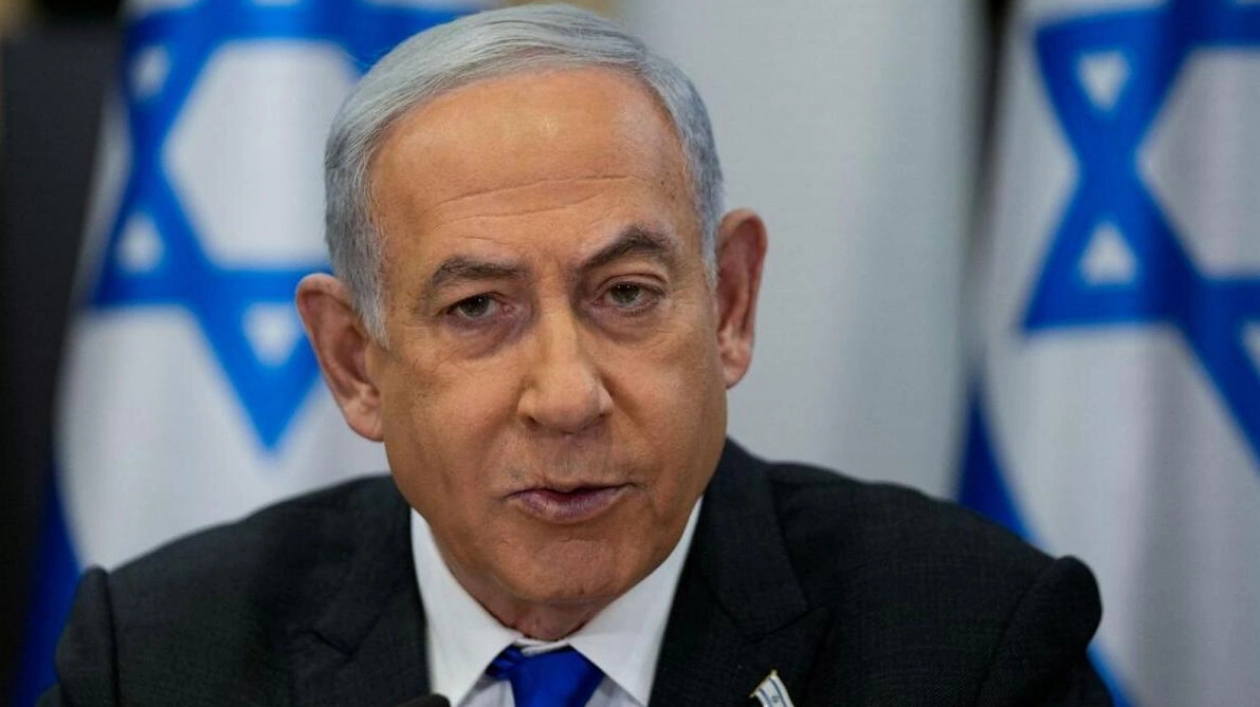Photo: Reuters
Prime Minister Benjamin Netanyahu announced on Sunday that Israel's 'precise and powerful' strikes on Iran had been successful, as his country's forces targeted locations in Gaza and Lebanon. The previous day's attacks by Israeli aircraft on military sites in Iran had sparked concerns that the Middle East was heading towards a broader conflict, prompting international calls for restraint. However, Iranian leaders downplayed the significance of the strikes, stating that they caused only minor damage and resulted in the deaths of four soldiers. Netanyahu emphasized that the raids were intended to retaliate against an earlier Iranian missile attack on Israel.
'The attack in Iran was precise and powerful, achieving all of its objectives,' Netanyahu said during a speech commemorating the official Hebrew calendar anniversary of the Hamas attack on October 7 last year. Israel's strikes were in response to an October 1 attack by Iran, which launched approximately 200 missiles at Israel, though most were intercepted by the country's air defenses. Netanyahu stated: 'We kept our promise. The air force attacked Iran and hit Iran's defense capabilities and missile production.'
His speech was interrupted by emotional reactions from relatives of victims of the Hamas attack in the audience. Netanyahu stood silently for over a minute during the live-broadcasted ceremony. There has been significant public and diplomatic pressure on the Israeli government to secure the release of the remaining captives held in Gaza. Israeli spy chief David Barnea is scheduled to travel to Qatar on Sunday for talks aimed at resuming negotiations for a hostage deal. Families of the hostages have urged the Israeli government to broker an agreement following the recent killing of Hamas leader Yahya Sinwar.
Israeli and US officials, along with some analysts, believe Sinwar was a major obstacle to a deal that could free up to 97 hostages still held by militants in Gaza. Earlier on Sunday, Israeli Defense Minister Yoav Gallant acknowledged that 'painful concessions' would be necessary to secure their release and that military action alone would not achieve Israel's war objectives. Despite discussions of negotiations, Israel continued its military operations in Gaza and Lebanon. Smoke filled the southern suburbs of Beirut after a night of bombardment, while reports indicated strikes in and around southern cities such as Sidon, Tyre, and Nabatiye. Lebanon's health ministry reported at least eight deaths and 25 injuries near Sidon.
The ongoing conflict has resulted in at least 1,615 deaths in Lebanon since September 23, according to an AFP tally based on official figures, though the actual number is likely higher due to incomplete data. The Israeli military claimed to have killed 70 Hezbollah fighters and struck 120 targets in southern Lebanon, while losing four soldiers in ground combat. The military warned residents to evacuate more villages believed to be housing Hezbollah sites for their safety.
Intense bombing also continued in densely populated Gaza. The Israeli military reported the killing of another 40 militants in the territory, despite Gallant's statement that 'in the south (Gaza), Hamas has ceased to act as a military structure.' United Nations Secretary-General Antonio Guterres expressed profound concern for the plight of Gaza's civilians. 'The situation for Palestinian civilians trapped in north Gaza is unbearable,' said Guterres's spokesman. Israel initiated a major operation in northern Gaza several weeks ago, particularly around Jabalia and its neighboring refugee camp.
'The Secretary-General is deeply disturbed by the alarming levels of death, injury, and destruction in the north, with civilians trapped under rubble, the sick and wounded lacking access to essential healthcare, and families without food and shelter,' the spokesman added. At the Al-Ahli hospital in Gaza City, Jihad Muqat grieved the loss of his wife and two infant daughters, whose bodies were recovered from the rubble in Jabalia camp.
Israel launched its offensive in Gaza a year ago in response to Hamas's October 7 attack, which resulted in the deaths of 1,206 people, mostly civilians, according to an AFP tally of official Israeli figures. At least 42,924 Palestinians, the majority of whom are civilians, have been killed in the Israeli offensive on Gaza, according to figures from the Hamas-ruled territory's health ministry, which the UN considers reliable. The conflict has involved Iran-backed groups across the region, notably Hezbollah in Lebanon, as well as militias in Iraq, Syria, and Yemen. Iran's missile attack and Israel's air strikes have raised fears of a direct war, but Iran's supreme leader Ayatollah Ali Khamenei stated on social media that the attack 'should neither be exaggerated nor minimized.'
Earlier, the Iranian armed forces general staff indicated that while it was 'reserving its legal and legitimate right to respond at the appropriate moment, Iran is prioritizing the establishment of a lasting ceasefire in Gaza and Lebanon.'
Source link: https://www.khaleejtimes.com






